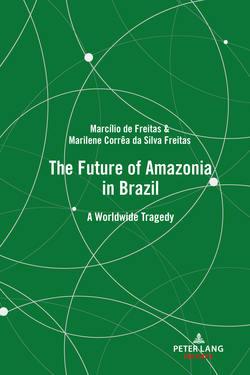Читать книгу The Future of Amazonia in Brazil - Marcílio de Freitas - Страница 9
На сайте Литреса книга снята с продажи.
Оглавление←x | xi→
Preface
The objective of this book is to disseminate and popularize Amazonia’s importance for people and mankind. It also presents denunciations on the destructive interventions made by Brazil’s new president on the use and protection policies of Amazonia.
We hope that readers will increase their efforts in Amazonia’s defense and protection, at all times, in all places. Its material and symbolic importance for Brazil and the world goes beyond the Brazilian state’s political interests. Its geography, history, and cultural and theological significance are intertwined with universal history.
Through a prospective study, structural issues that affect Amazonia’s ecological and cultural complexity and its globalization are analyzed in this book. Its insertion in world geopolitics permeated by sustainability is presented through macro-scenarios. The use of macro-scenarios in the description and analysis of the problems presented in this book open the way to a more consistent and systemic interdisciplinary approach. What is lost in detail in the analysis of the focal problems is gained in integration and interpretation. As a result, we have book’s better thematic unity. This methodological strategy allows us to identify and apprehend the heuristic range of the book’s proposal, and its main contributions more quickly. It is organized in nine chapters.
←xi | xii→
The first is a brief retrospective study on its political geography, environmental scenarios, and links with the world. Some of the scenarios predicted for the environment, Amazonia, and sustainability are reviewed, raising the question of science education in terms of “What is Amazonia’s role in the world? And what is the world’s role in Amazonia?” The second chapter presents the globalization of environmental issues and the uncertainties and controversies of the twenty-first century. The third is centered on the utopias of the twenty-first century. Contradictions in Western culture are analyzed. The scientific, economic, and political connections between sustainable development and the places, regions, and the world are shown. The relations between Amazonia and the new world contracts are presented, reaffirming again Amazonia’s importance to mankind. The fourth chapter analyzes the nexus between science, religion and the origins of universe and life within the context of sustainability. It articulates science and religion emphasizing the contradictions, ruptures, and links with sustainability and Amazonia. Scenarios that discuss Amazonia’s ecological, theological, and scientific importance to the current civilization framework are presented. It also presents the importance of sustainability to citizen education, mankind, and the planet’s future. Finally, it concludes with important considerations on the insertion of sustainability in social, economic, scientific, and religious processes. The fifth chapter reaffirms sustainability as the main invention of the twenty-first century. Exploratory studies are presented on the aspects of processes of Western civilization, which have contributed to sustainability as fundamental to the solution of postmodernity’s complex issues. It proposes to expand the significance of the concept of sustainability and its application to scenarios immersed in the nature-culture universe. The sixth chapter presents the predatory development of Amazonia dating from the beginning of the twentieth century. It shows that capitalism does not have the heuristic reach to economically exploit Amazonia while preserving its biomes. Proposals and uncertainties concerning Amazonia’s ecological issues are analyzed. Environmental and social impacts from large socioeconomic development projects implemented in the region are shown. Technical elements to clarify the sustainability concept and its correlation with the development of Amazonia and the world are presented and analyzed. In the seventh chapter , several actions taken by Brazil’s new president designed to destroy important sustainable programs from Amazonia and Brazil are presented. It shows politics in the service of non-sustainability. Environmental and social tragedies caused by large mining companies are also analyzed. The study reaffirms the incompatibility of predatory capitalist productive forces with the sustainability of places and people. It also shows the control that these productive forces have over the national state, turning it into a weapon against citizenship. Through macro-scenarios, the eighth chapter ←xii | xiii→shows from a humanist perspective, that the history of capitalist and communist expansion was a tragedy. To this day, capitalism continues destroying the environments and cultures of colonized peoples. Its wars and the unsustainable use of the planet are a growing threat to mankind’s future. In bloodthirsty actions, the use of weapons always surpasses diplomacy and sustainability. The Vietnam War remains as a singular example.
In a slower and camouflaged but no less predatory form, the repetition of this history is fully under way in Amazonia. The Brazilian state is its main protagonist. To illustrate this framework, several scientific and ethnological scenarios from Brazilian Amazonia are presented, and the importance of this region to contemporary world is emphasized. Finally, in the ninth chapter, our commitment to sustainability and the preservation of Amazonia are presented, along with the six main issues raised by the twenty-first century’s concern with sustainable development. All related to the accumulation, expansion, and circulation of capital.
As proposed by the authors, this book has broadened the meaning of the notion of sustainability and reaffirmed the importance of Amazonia for Brazil and mankind. In this complex panel, it presents new theoretical and empirical elements in order to understand Amazonia and its links with sustainability, culture, and nature. It also constitutes a complaint against the destruction of Amazonia and an instrument for environmental preservation and education for sustainability. Brazilian Amazonia is in jeopardy. This potential tragedy has accelerated this publication.
Manaus, October, 14, 2019
Marcílio de Freitas
←xiii | xiv→
